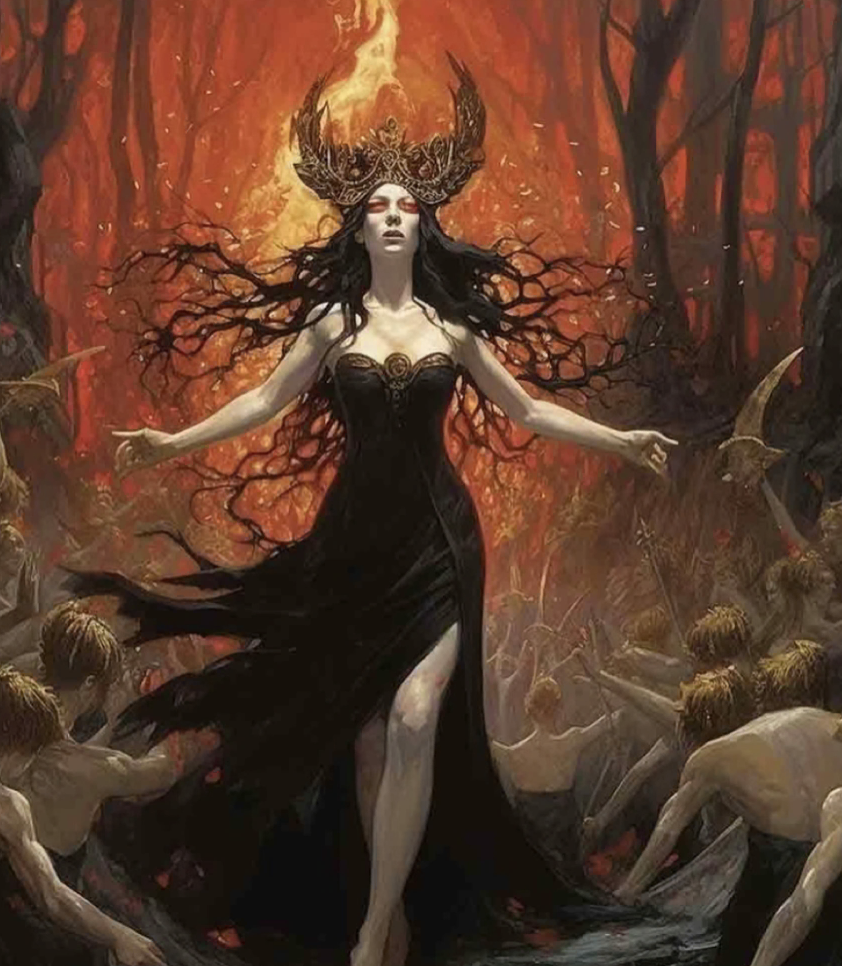This story represents what I believe so many of us struggle to reconcile during the change of seasons, particularly moving toward fall and winter, as we move into more darkness, more solitude, more turning inward. Are we able to recognize the beauty and value of rest and renewal, of silence and knowledge and paradox? I wonder, too, in intimacy… many times we are in growth phases, where we’re working through shadow and mystery and complexity; and then we sometimes find renewal in sweetness, play, and aliveness. Personally, I love this story and find myself reading and sharing it each season as the days grow shorter and the darkness envelopes us in quiet.
May you also feel how these seasons might support you in allowing yourself to be guided by your need for both lightness and growth, as well as silence and reflection.
PERSEPHONE REMEMBERS
In the world of the dead there's no time. Yet every autumn, as the days grow shorter, the spirits of the underworld sense that Persephone must soon return. They grow restless and call to her with lost, hollow voices. In the world of living, the sound of their cries become the sound of the wind sighing and the dry grass moaning through the bare trees. For many of the living, it is the sound that speaks to them of the frailty of life and the ultimate, unknowable void of death. They draw closer to the fire and to one another, and they cherish the warmth of life.
When Persephone hears the first, faint sighs of the dead in the cooling Autumn winds, she is filled with dread. “They call me, they call me,” she thinks as she gathers the harvest. “But how can I leave this life? It is so beautiful. The sky is too blue, the sun too warm, the air too sweet to leave behind. The spirits of the dead cannot understand. They are cold and remote. They have forgotten the beauty of life.”
The wind grows cold, and the cries of the dead become more insistent. Her promise to return to them weighs in Persephone's heart. Her blood slows. Her steps falter. It is inescapable. She knows that she must make her farewells to the people and pleasures of the upper world and descend to her appointed place in the realm of the dead.
She gathers her last sheaves of wheat and baskets of fruit to take as gifts to the dead souls, so that they may remember, if only briefly, the joys of life. When her preparations are complete, she spends one last day gazing on the beauty of her world, drinking in its colors and sounds and fragrances so that she will not forget during her long stay in the dark. Finally, at dusk, she stands on the edge of the world and weeps as she watches the sun touch the horizon. In her hand she holds a pomegranate, the symbol of her promise to the souls of the dead. The sun drops behind the bulk of the earth, and Persephone lifts a single pomegranate seed to her lips.
The light shifts and ripples. The crash of thunder rips through the world. A screaming wind tears at her hair and stings her eyes. Before her, a chasm appears where the sun had only been moments before, and Persephone cries out in horror even as she leaps into the void. For a moment that seems like eternity she forgets who she is, where she is, and why.
Then, darkness…silence…warmth. The spirits of the dead surround her. They speak without voices. They sing without sound. They cry and laugh as she presents her gifts from the realm of the living, and they welcome her with gifts of their own. The gifts of the dead are those of knowledge and mystery and paradox. In this world of darkness, their eyes see patterns of incredible beauty, yet the patterns have neither color nor shape. Their ears hear rich, complex music, yet the music has neither pitch nor duration. Here every thought, every perception has endless variations. Persephone is fascinated, and she begins to remember.
In the world of the living days pass, weeks pass; in the world of the dead, there is no time. Persephone measures time in terms of insights and explorations. in the world of the living, Autumn turns to Winter, and the nights grow long; in the world of the dead, day and night have no meaning. Persephone and her subjects traverse the endless labyrinth, winding ever inward. In the world of the living the Winter Solstice approaches, and the people call forth the light; in the world of the dead, light and dark are one, there are no dualities. Persephone and her subjects are at the still, silent center, in an infinite darkness suffused with an infinite light.
In the world of the living, the solstice passes. The storms lessen. The bears and squirrels stir in their sleep. And, suspended in her timeless void, Persephone begins to feel the stirring of her own blood. The voices of life’s children are calling. Their voices are like buzzing and chittering of troublesome insects. Persephone hears their first, faint cries, and she is filled with dread and sorrow. “They call to me. They call to me,” she whispers as she floats in the void. “But how can I leave this? The mysteries are too intriguing, the knowledge is too profound, the intimacy of death is too sweet to abandon. The living are mere children. They cannot understand the depth of this existence.” But still, the days pass, and as the winter wanes, the cries of the living become more insistent. In the world of the dead, they create grating, discordant undertones in the pattern of silence and sound. Persephone’s promise to return burns in her heart. It is inescapable. She knows that she must make her farewells to the souls of the underworld, and ascend to her appointed place in the realm of the living.
She gathers gifts of peace and paradox to take to the living, so they might remember, if only briefly, the richly textured beauty of the dark. Finally, on the eve of the Spring Equinox, Persephone weeps as she floats in the darkness. In her hand, she holds a stock of wheat, the symbol of her promise to return to the living. For a single, timeless moment she turns her ears to the impossible music that sings to her. Finally, she raises a single grain of wheat to her lips.
The darkness shifts and ripples. The world is ripped by a crash of thunder. The wind shrieks around her. The void explodes with jarring colors and a cacophony of discordant sounds. Persephone cries out in terror even as she leaps into the blinding light. For a moment that seems like eternity she forgets who she is, where she is, and why.
And then gentle laughter… at the sounds of birds… the cool mist of morning’s breath. She is surrounded by children of the upper world. They bring her gifts of iris and apple blossoms, the scent of rain on the ocean, the sighs of lovers. She hears the whisper of the crocus at her feet welcoming her and spreading the word along the grassy hills – “She returns, she returns, Persephone returns.” And as the sun rises, Persephone is filled with joy and the wonder of life, and she begins to remember.
"Persephone Remembers" / Greek - by Irene A. Faivre
Printed in Parabola 21:2 - The Soul, Pages 70-72, published in Summer of 1996
Parabola is published quarterly by the Society for the Study of Myth and Tradition. Each issue includes:
* Original articles and interviews on mythology, spiritual practice, religious tradition, literature, popular culture, science, and the arts
* Retellings of traditional stories, myths, and fairy tales
* Book reviews
* Comments on contemporary film, theater, music, art, and events
* Artwork ranging from the traditional to the contemporary.



